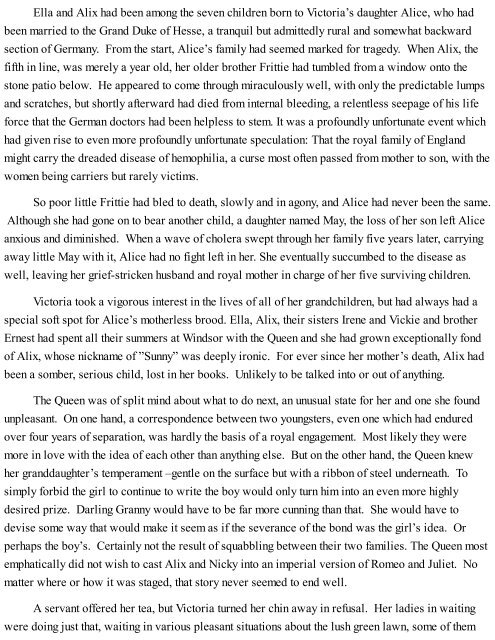Create successful ePaper yourself
Turn your PDF publications into a flip-book with our unique Google optimized e-Paper software.
Ella and Alix had been among the seven children born to Victoria’s daughter Alice, who had<br />
been married to the Grand Duke of Hesse, a tranquil but admittedly rural and somewhat backward<br />
section of Germany. From the start, Alice’s family had seemed marked for tragedy. When Alix, the<br />
fifth in line, was merely a year old, her older brother Frittie had tumbled from a window onto the<br />
stone patio below. He appeared to come through miraculously well, with only the predictable lumps<br />
and scratches, but shortly afterward had died from internal bleeding, a relentless seepage of his life<br />
force that the German doctors had been helpless to stem. It was a profoundly unfortunate event which<br />
had given rise to even more profoundly unfortunate speculation: That the royal family of England<br />
might carry the dreaded disease of hemophilia, a curse most often passed from mother to son, with the<br />
women being carriers but rarely victims.<br />
So poor little Frittie had bled to death, slowly and in agony, and Alice had never been the same.<br />
Although she had gone on to bear another child, a daughter named May, the loss of her son left Alice<br />
anxious and diminished. When a wave of cholera swept through her family five years later, carrying<br />
away little May with it, Alice had no fight left in her. She eventually succumbed to the disease as<br />
well, leaving her grief-stricken husband and royal mother in charge of her five surviving children.<br />
Victoria took a vigorous interest in the lives of all of her grandchildren, but had always had a<br />
special soft spot for Alice’s motherless brood. Ella, Alix, their sisters Irene and Vickie and brother<br />
Ernest had spent all their summers at Windsor with the Queen and she had grown exceptionally fond<br />
of Alix, whose nickname of ”Sunny” was deeply ironic. For ever since her mother’s death, Alix had<br />
been a somber, serious child, lost in her books. Unlikely to be talked into or out of anything.<br />
The Queen was of split mind about what to do next, an unusual state for her and one she found<br />
unpleasant. On one hand, a correspondence between two youngsters, even one which had endured<br />
over four years of separation, was hardly the basis of a royal engagement. Most likely they were<br />
more in love with the idea of each other than anything else. But on the other hand, the Queen knew<br />
her granddaughter’s temperament –gentle on the surface but with a ribbon of steel underneath. To<br />
simply forbid the girl to continue to write the boy would only turn him into an even more highly<br />
desired prize. Darling Granny would have to be far more cunning than that. She would have to<br />
devise some way that would make it seem as if the severance of the bond was the girl’s idea. Or<br />
perhaps the boy’s. Certainly not the result of squabbling between their two families. The Queen most<br />
emphatically did not wish to cast Alix and Nicky into an imperial version of Romeo and Juliet. No<br />
matter where or how it was staged, that story never seemed to end well.<br />
A servant offered her tea, but Victoria turned her chin away in refusal. Her ladies in waiting<br />
were doing just that, waiting in various pleasant situations about the lush green lawn, some of them
















